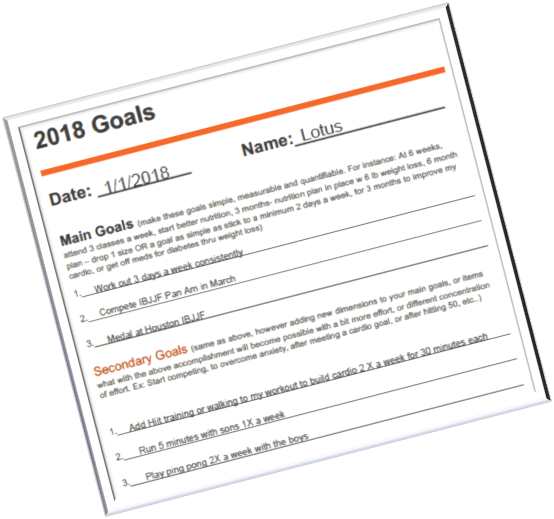7 Reasons Why New Years’ Resolutions Fail, and How You Can Stay on Track
It’s week two of the New Year, how are your New Years’ Resolutions? Do your resolutions look like these?
- This year I need to get healthier because I can’t make it up the stairs without feeling like I’m going to pass out!
- This year I will lose the weight I need.
- ‘It’ will be the ‘New Me’!
- This year will be different, and better!
Stop! This is what happened last year with your goals! What does ‘different’ and ‘better’ mean? What is a ‘New Me’? Resolutions are in the sense of goals ‘decisions, or pledges’ to make a change. Are your resolutions well on the way to becoming a reality, or have they already failed? If you are not making the kinds of resolutions that you can put a √ on after a defined amount of time, you will fail! Here are 7 reasons you will fail at keeping your resolutions.
Reason 1: Resolutions Alone
If it’s going to the gym more often, don’t do it alone. Get an accountability buddy that will push you to commit to them and their success as well as yours. The reverse is true, and will hold each other to train unless you really can’t because you are deathly ill. According to success coach Amy Applebaum, accountability is essential for success. “Surround yourself with people who inspire you to be more, do more…”
Reason 2: Unrealistic Resolutions
I read a quote in Shape Magazine I loved! “If your goal is to solve world peace, maybe a more attainable goal is to vow you’ll finally read War and Peace.” Another example is to make a resolution to lose 100 lbs and make it a short time frame that is physically unachievable. Or if you make a resolution but don’t think you need to change your daily behavior. That is unrealistic!
Reason 3: Giving Up Too Easily
Everyone will at some point do something counteractive to what their goals are long term. Making one mistake for 5 minutes, like eating a Twinkies on a diet, is not a failure. Failure is a compilation of mistakes that lead you to miss a longer-term goal. If you get discouraged or simply lose interest one day, reset the next day. If you made a mistake yesterday, something as easy as working harder the next day will make up for it.
Reason 4: Time Management Failure
Sometimes you realize your resolution is a bigger time commitment than you’d originally intended. If organizing your garage is a big job, instead of trying to accomplish it all in one day, break it up into manageable increments. It is called madness when you continue to maintain the behavior you are trying to change, and expect new results. Add daily, weekly and monthly changes to your tasks on your schedule to meet your goals. Seeing those smaller time commitments make a dent on your bigger goal, will keep you motivated, and committed.
Reason 5: No Plan
Benjamin Franklin, considered the father of Time Management once said: “Failing to plan is planning to fail” People set themselves up for failure because they commit to a resolution, yet have no plan in place to actually achieve it. You have to make a daily commitment to goals in order to realize them. Adding calendar entries of tasks to your day, is one of the ways to meet the bigger goal of working out ‘more’ into a measurable ‘3 times a week’. Adding an appointment for 30 minutes 3 days a week to work in the garage, will keep on on task to accomplish your bigger goal of cleaning the garage by Spring. If you can’t keep the appointment, move the appointment to another day, in order to stay on track.
Reason 6: Lack of Honesty
Examine your resolutions. Are they what you really want, or did you commit to them because you thought you should? ‘I want to get in better shape for my kids or husband’ is great, but you need to make it a tangible resolution for your own personal reward. Are you committed to a goal you really want to achieve for yourself? Be honest. Take a hard, long look in the mirror. Resolutions and meeting goals require changes in behavior. Most of us don’t want to face that there is often a laundry list of changes to make. Are you telling yourself ‘Enough is enough? Failing at your goal has to become a much worse consequence than to continue as you are.
Reason 7: Lack of Reward
Don’t wait to meet 100% of the goal before rewarding yourself. Your plan should have a reward built into it, in order to work. The problem is that many individuals think you either have achieved your goal or you have failed. If training 3 times a week is your goal, and you used to NOT train at all, congratulate yourself and feel good about your first training session. Stop and think about how great you feel after that workout. The natural feeling of accomplishment will reward you, and keep you on track. Celebrate with a smoothie or juice at the juice bar with a new buddy at the gym, two different rewards built into one, for attending the new gym. Be as kind to yourself, as you are to others. If you can’t attend one day, add another day to your schedule. One mistake does not make a total failure. Build on your successes, not on your mistakes.
After working in a competitive business corporate environment for more than 30 years, of which 19 was running my own business, I look back at companies who invested a lot of money in training their employees to set, measure, and reward success in their goals with the company. Achieving these goals increased not only productivity and effectiveness in large corporations, but it also meant happier and longer lasting employees. Employees are the single most important asset a company has. You can use the same model to keep your resolutions real and achievable this year. After all, employees are people that go home and SHOULD have their own personal set of achievable goals to make themselves happier and more efficient with their lives.
We will help you make S.M.A.R.T. goals to help put some glue on those resolutions, and make them stick! Tune in to our next article! OSS! Never.Ever.Give.Up.. Because you are worth it!





0 Comments